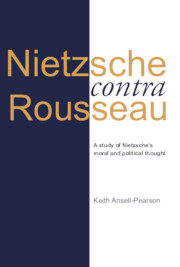Book contents
- Frontmatter
- Contents
- Preface
- Note on the texts and list of abbreviations
- Introduction
- 1 Nietzsche contra Rousseau
- 2 Civilization and its discontents: Rousseau on man's natural goodness
- 3 Squaring the circle: Rousseau on the General Will
- 4 Nietzsche's Dionysian drama on the destiny of the soul: on the ‘Genealogy of Morals’
- 5 Zarathustra's descent: on a teaching of redemption
- 6 Bending the bow: great politics, or, the problem of the legislator
- Conclusion
- Notes
- Bibliography
- Index
1 - Nietzsche contra Rousseau
Published online by Cambridge University Press: 03 May 2011
- Frontmatter
- Contents
- Preface
- Note on the texts and list of abbreviations
- Introduction
- 1 Nietzsche contra Rousseau
- 2 Civilization and its discontents: Rousseau on man's natural goodness
- 3 Squaring the circle: Rousseau on the General Will
- 4 Nietzsche's Dionysian drama on the destiny of the soul: on the ‘Genealogy of Morals’
- 5 Zarathustra's descent: on a teaching of redemption
- 6 Bending the bow: great politics, or, the problem of the legislator
- Conclusion
- Notes
- Bibliography
- Index
Summary
‘What is the occasion?’ the people asked.
‘We're waiting to see Jean-Jacques’, came the reply.
‘Who or what is Jean-Jacques?’
‘We don't know, but he's going to pass this way’.
A crowd gathered in the square of the Palais RoyalINTRODUCTION
On a number of occasions Nietzsche described himself as being ‘contra Rousseau’. Rousseau was without doubt a key thinker for Nietzsche, one who played an important adversarial role in his construal of modernity, and whom he had to come to terms with in order to clarify his own status as a philosopher and educator. In a revealing passage in Assorted Opinions and Maxims, Nietzsche informs his readers that there are only eight thinkers that he has had to come to terms with, and from whom he will accept judgement. Significantly, Rousseau is one of them. In Nietzsche's account of modernity Rousseau plays the role of the moral fanatic whose writings inspire the slave revolts in morality of the modern era (notably the French Revolution). But, in conceiving his relation to Rousseau in such antagonistic terms, Nietzsche reveals just how important Rousseau is to him. The ambiguous nature of the Rousseau–Nietzsche relationship has been captured well by Karl Löwith:
As a critic of the existing world, Nietzsche was to the nineteenth century what Rousseau had been to the eighteenth century. He is a Rousseau in reverse: a Rousseau, because of his equally penetrating criticism of European civilization, and in reverse, because his critical standards are the exact opposite of Rousseau's ideal of man.
- Type
- Chapter
- Information
- Nietzsche contra RousseauA Study of Nietzsche's Moral and Political Thought, pp. 19 - 52Publisher: Cambridge University PressPrint publication year: 1991



